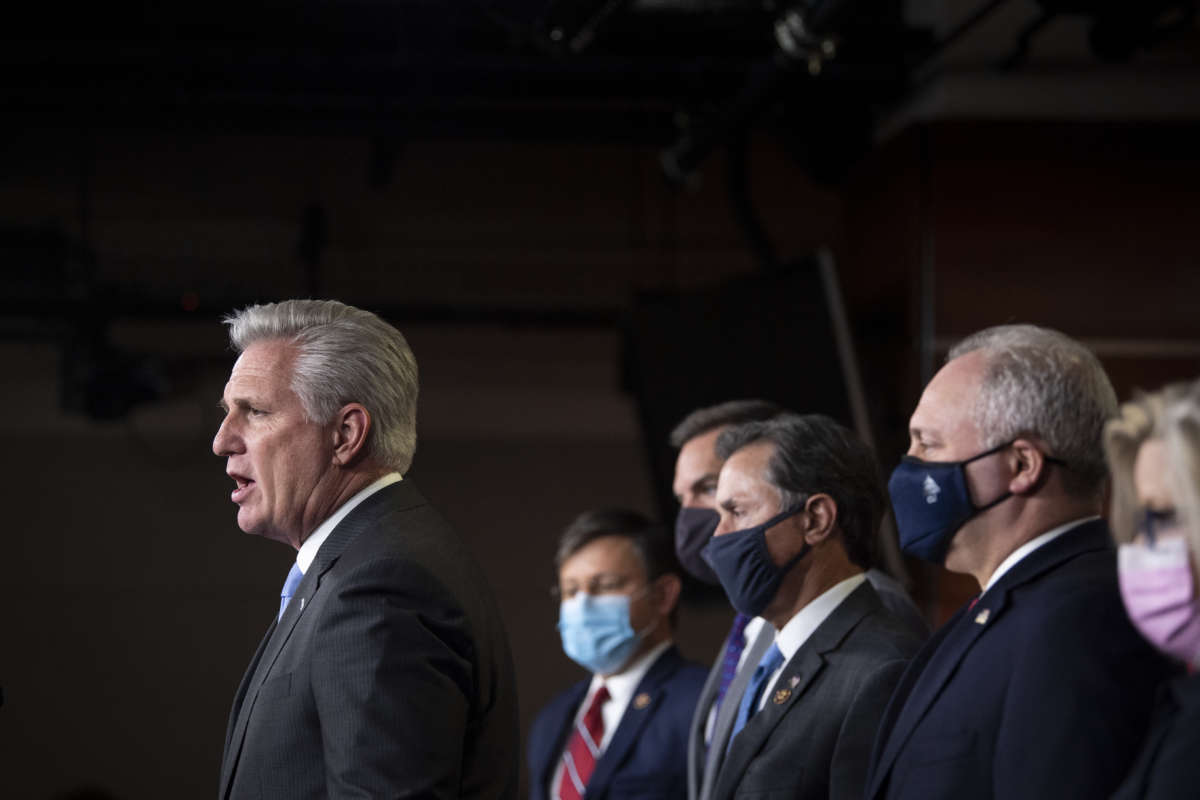Did you know that Truthout is a nonprofit and independently funded by readers like you? If you value what we do, please support our work with a donation.
With mass layoffs persisting at an unprecedented clip, coronavirus deaths surging, and hunger on the rise nationwide, a group of House Republicans on Thursday attempted to pass a motion to adjourn the chamber in what Democratic lawmakers denounced as an “outrageous” stunt by members of a party that continues to stand in the way of desperately needed economic relief.
Though the motion, introduced by House Freedom Caucus Chair Rep. Andy Biggs (R-Ariz.), was ultimately defeated by the Democrat-controlled House, the attempt to adjourn was viewed as another telling example of the GOP’s refusal to take seriously the coronavirus pandemic and resulting economic crisis.
“People are going hungry and they’re treating this like a game,” Rep. Alexandria Ocasio-Cortez (D-N.Y.) tweeted in response to the motion, which Republicans used to complain about House rules allowing proxy voting to prevent the spread of Covid-19 on Capitol Hill. “Leaders don’t abandon people in their time of greatest need.”
Rep. Eric Swalwell (D-Calif.) called the GOP ploy “batty” and noted that “Americans are in dire need of food and paychecks.”
Over the opposition of the chamber’s Republicans, House Democrats in October passed legislation that would send another stimulus check to most Americans, restore the lapsed $600-per-week federal unemployment boost, and provide aid to cash-strapped state and local governments. The Republican-controlled Senate, led by Majority Leader Mitch McConnell (R-Ky.), has refused to consider the measure.
“More people died yesterday from Covid-19 than any day since,” Swalwell said Thursday. “We have work to do. Yet, the House GOP just motioned to adjourn Congress. What the hell are they doing?”
“Isn’t this a procedural stunt you ask? Sure,” Swalwell continued. “What makes it outrageous is a single vote now takes well over an hour to occur with Covid-19 restrictions in place. Then the chamber must be sanitized. These are final days of Congress. It’s like pulling the fire alarm during a final exam.”
Other Democratic members voiced similar outrage over the motion, introduced as U.S. coronavirus hospitalizations soared to a record high and the Labor Department reported that a million Americans filed jobless claims last week, a blaring signal that the economic crisis is nowhere near over.
Right now a Republican member has put up a Motion to Adjourn, I am voting against it. I seriously don’t know why any member wants to adjourn while we have work to do on behalf of so many Americans who are suffering right now.
— Ilhan Omar (@IlhanMN) December 3, 2020
Nearly 18 million adults are behind on rent & mortgage payments.@SenateGOP refuses to act on numerous relief bills the House has passed & @HouseGOP just issued a motion to adjourn.
The Republican party’s contempt for working people is on full display.https://t.co/NC31S3HUJy
— Congresswoman Ayanna Pressley (@RepPressley) December 3, 2020
The House GOP’s procedural maneuver came as coronavirus relief negotiations showed signs of life for the first time in weeks, with a possible government shutdown just seven days away and the end of the year rapidly approaching. Failure to approve additional Covid-19 relief before year’s end would be disastrous, economists have warned, particularly given that more than 13 million Americans are set to lose unemployment benefits as emergency federal programs expire on December 26.
House Speaker Nancy Pelosi (D-Calif.), Senate Minority Leader Chuck Schumer (D-N.Y.), and President-elect Joe Biden have expressed support for using a $908 billion bipartisan compromise proposal unveiled earlier this week as a framework for talks going forward, while acknowledging that the plan — which lacks direct payments and provides just $300 per week in additional unemployment benefits — is nowhere near sufficient.
“Of course, we and others will offer improvements, but the need to act is immediate and we believe that with good-faith negotiations we could come to an agreement,” Pelosi and Schumer said in a joint statement Wednesday. “In light of the urgency of meeting the needs of the American people and the hope that the vaccine presents, it’s time for Leader McConnell to sit down with Democrats to finally begin a true, bipartisan effort to meet the needs of the country.”
McConnell and Pelosi spoke by phone Thursday afternoon for the first time since the presidential election and, according to the Kentucky Republican, had a “good conversation” about coronavirus relief and an end-of-year spending package to avert a government shutdown.
“Compromise is within reach,” McConnell said in a floor speech Thursday. “We know where we agree. We can do this.”
The Republican leader’s remarks came just days after he circulated a relief proposal of his own that was immediately dismissed as a non-starter by many Senate Democrats and progressive critics, who lambasted the plan’s sweeping liability shield for corporations and exclusion of additional weekly unemployment benefits.
Jeremy Funk, spokesperson for government watchdog group Accountable.US, slammed McConnell for “shilling for special interests” instead of offering real relief to the tens of millions of Americans struggling to afford basic necessities and possibly facing eviction in the near future.
“The McConnell Senate enabled the Trump administration’s mismanagement of the health crisis and still insists on doing as little as possible to contain the economic fallout,” said Funk. “McConnell’s big idea of giving corporations permission to mistreat workers with impunity during a pandemic and giving more handouts to coal CEOs means absolutely nothing to the millions of families who face hunger and homelessness in the Trump recession.”
Media that fights fascism
Truthout is funded almost entirely by readers — that’s why we can speak truth to power and cut against the mainstream narrative. But independent journalists at Truthout face mounting political repression under Trump.
We rely on your support to survive McCarthyist censorship. Please make a tax-deductible one-time or monthly donation.
